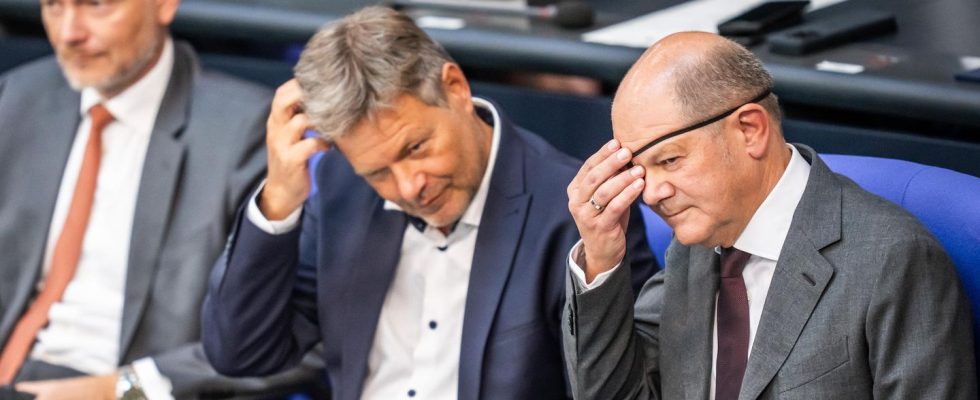Press review for the general debate
Scholz must win the opposition for the “Germany Pact” – “that is an opportunity and a problem at the same time”
It’s tearing your hair out: Chancellor Olaf Scholz (right) with his coalition partners Robert Habeck (Greens) and Christian Lindner (FDP) at the general debate in the Bundestag
© Michael Kappeler / DPA
After two years in office, Chancellor Olaf Scholz wants to move the Federal Republic forward with a Germany Pact. High time, according to the press. Only: Can the coalition do it?
The German press takes a similar view. But many journalists are critical of whether Germany can implement its plan. The government presents itself as a “creative force”, but delivers too little.
Germany Pact with or without Union?
“Leipziger Volkszeitung”: “If Chancellor Olaf Scholz really wants the Germany Pact, which would be of fundamental importance for social cohesion and would also send a clear signal to AfD supporters, he must involve the Union. If the AfD’s poll high is not temporary , Germany will have to get used to coalitions with many partners. The Germany Pact would then also be a good exercise before the next elections in the federal states and in 2025 in the federal government.”
“Nuremberg Newspaper”: “For the Union, the chancellor’s offer of cooperation is both an opportunity and a problem. Having an influence on government policy seems worth striving for. If the Union were to reject the chancellor’s offer, it would be a notorious refusal faction. What the chancellor’s offer is worth , but will have to be measured by results. The Union is already setting the first conditions in migration policy. The Greens will hardly go along with that. What then?”
“Frankfurter Allgemeine Zeitung”: “Scholz’s offer seems like an admission that his government is overwhelmed by its own coalition agreement. The coalition itself would first have to make a pact in order to be able to vigorously tackle what it has set itself. That it doesn’t work at all or progress only selectively is because the traffic light is divided (…) The list of projects that cry out for progress and speed is therefore getting longer and longer (…) The coalition talks its way out when it calls the ‘standstill ‘, which Scholz now openly admits, is pushing the years of the grand coalition. (…) If Scholz wanted to say with his call for help that this coalition is not able to do what needs to be done, no pact is necessary. For such cases, the script of democracy calls for a change of government.”
daily News: “The federal government as a creative force in times of crisis – the chancellor drew this picture in his speech with self-confidence. (…) But that does not fit with the traffic light coalition that is constantly preoccupied with itself. (…) And on the other hand, the ” Germany Pact” little prospect of surviving this day. Because CDU leader Merz would like to make an agreement with the liberals – and only with the liberals, and otherwise relies on confrontation. The courted state leaders are also far away EU in Brussels for a bridging industrial electricity price, of which the Chancellor is known to think little. The traffic light coalition will have to be the creative force itself.”
“It must finally be delivered”
“Frankfurter Rundschau”: “Historical hour in the German Parliament: For the first time, a Federal Chancellor holds a second inaugural speech – and that almost two years after the beginning of his term of office. At the same time he is campaigning for a very grand coalition: In a Germany pact, the federal government, states, municipalities and gladly also the opposition in the Bundestag are working to bring this country forward. A wonderful idea, if it didn’t come from someone who has been head of the Federal Chancellery for almost two years. He doesn’t have to carry out the reforms that this country needs alone. But it does It is his job to create the framework conditions for this. The sentence that he (and we citizens!) are tired of the standstill, he could have said long ago to his Transport Minister Volker Wissing (FDP), for example. He is for the railways responsible and for the digital. Both very sad chapters in the mildew republic. One thing is clear: there will only be fewer disputes and a better mood in the country after noticeable reforms. We are still waiting for that.”
“Lausitz Review”: “While Scholz promised an economic miracle in the spring, halfway through his term in office he now has to accept that the upswing project, despite the war in Ukraine and climate change, is beyond the power of his traffic light government ‘Democratic opposition’ enters into the pact. She would have reason to be suspicious, as CDU leader Friedrich Merz explained in the Bundestag.The Union had given its hand to the Bundeswehr special fund after the Russian attack on Ukraine, only to now determine how in terms of defense budget is now being tricked. At least that’s not how trust was created.”
“Handelsblatt”: “Germany must become faster, more modern and less bureaucratic. But the federal and state governments have been arguing for a long time about a ‘pact for planning acceleration’. It must finally be delivered – no matter what the title of the law is in the end. One would like to see everyone involved, including the CDU -Call to boss Friedrich Merz: Sit down at a table and get started!”
Sources: Tagesschau.de


